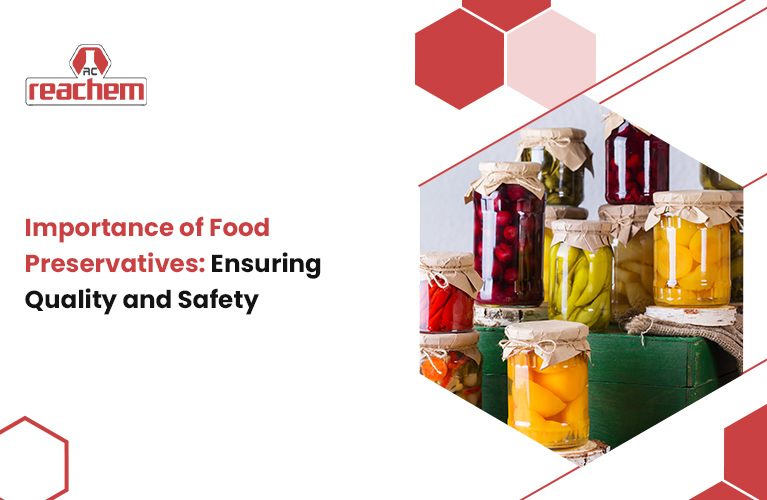wordpress-seo domain was triggered too early. This is usually an indicator for some code in the plugin or theme running too early. Translations should be loaded at the init action or later. Please see Debugging in WordPress for more information. (This message was added in version 6.7.0.) in /var/www/reachemchemicals.com/blog/wp-includes/functions.php on line 6131
Food preservatives play a crucial role in our daily lives. These substances help keep our food fresh, safe, and flavorful for extended periods. Without preservatives, many of the foods we enjoy would spoil quickly, leading to waste and potential health risks. This blog will explore the importance of food preservatives, their types, and their benefits. It will also address common concerns and misconceptions about these essential food additives. Whether you’re a food enthusiast or just curious, this guide will provide valuable insights into how preservatives contribute to the quality and safety of our food.
Food preservatives are substances added to food products to prevent spoilage, bacterial growth, and oxidation. They help extend the shelf life of foods, ensuring they remain safe and nutritious for consumption. Preservatives can be natural or synthetic and are used in various foods, from bread and dairy products to meats and snacks.
There are several types of food preservatives, each with specific functions and benefits. Here are some common types:
Antimicrobial preservatives inhibit the growth of bacteria, yeast, and molds. They are essential for preventing foodborne illnesses. Key examples are:
These preservatives help keep food safe by preventing harmful microbial growth.
Antioxidants prevent oxidation, which can cause food to become rancid and lose flavor and nutrients. Key examples are:
Antioxidants protect the quality and taste of food by preventing oxidative damage.
Chelating agents bind with metal ions, which can catalyze spoilage and oxidation reactions in food. Key examples are:
Chelating agents help maintain the quality and appearance of food products.
Natural preservatives are derived from natural sources and are preferred by consumers seeking clean-label products. Key examples are:
Natural preservatives offer an alternative for those looking for more naturally preserved foods.
Food preservatives offer numerous benefits, making them indispensable in the modern food industry. Here are some key benefits:
Preservatives significantly extend the shelf life of food products, reducing waste and ensuring that food remains safe for longer periods. Benefits are:
Extending shelf life is crucial for both economic and environmental reasons.
Preservatives play a vital role in ensuring food safety by preventing the growth of harmful microorganisms. Benefits are:
Food safety is a top priority in food production and consumption.
Preservatives help maintain the taste, texture, and nutritional value of food products. Benefits are:
Quality preservation ensures that food remains enjoyable and nutritious.
Preservatives allow for the production and distribution of convenient, ready-to-eat food products. Benefits are:
Convenience is a significant factor in the modern lifestyle, making preserved foods highly valuable.
While food preservatives offer many benefits, there are also common concerns and misconceptions about their use.
Some people worry about the potential health effects of synthetic preservatives. Key points are:
Understanding the regulations and research behind preservatives can alleviate health concerns.
There is a debate about the safety and efficacy of natural versus synthetic preservatives. Key points are:
Both types of preservatives have their place in the food industry.
Some individuals may have allergies or sensitivities to specific preservatives. Key points are:
Clear labeling helps consumers make informed choices about the foods they eat.
Food preservatives are essential for maintaining the quality, safety, and convenience of our food. They extend shelf life, prevent spoilage, and ensure that food remains safe and enjoyable. While there are concerns and misconceptions about their use, preservatives are regulated and researched to ensure they are safe for consumption. Understanding the role and benefits of food preservatives helps us appreciate the effort that goes into keeping our food fresh and secure. Whether natural or synthetic, preservatives play a crucial role in the modern food industry, contributing to the availability and quality of the foods we enjoy every day.